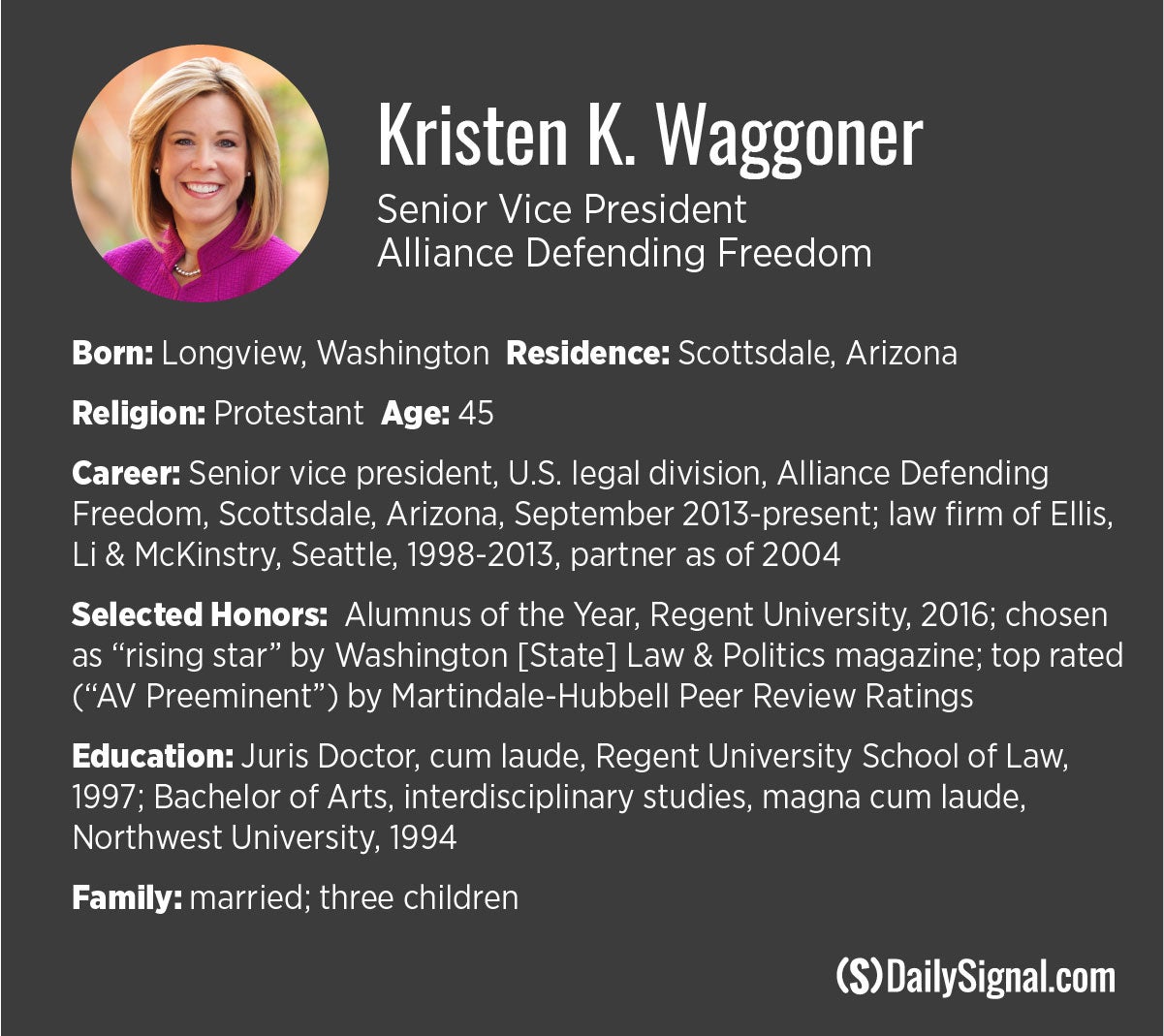Meet the Lawyer Who’ll Argue at Supreme Court for Christian Baker’s Right to Free Speech
Ken McIntyre /
As far back as grade school, Kristen Waggoner’s father taught her to seek God’s purpose for her life.
This paternal counsel, after much prayer, resulted in her knowing her calling at age 13.
But growing up in a small mill town in Washington, she could not have guessed that, little more than 30 years later, she would be a lawyer arguing a widely known case in the nation’s capital before the nation’s highest court.
“My hope is that the court will use this case as an opportunity to say, ‘We’re protecting the liberty of both sides,’” Waggoner says.
Talk about culminations.
Waggoner will stand Tuesday before the nine justices of the Supreme Court and ask them to protect a Colorado baker’s constitutional right not to be forced by the government to create a custom cake celebrating a same-sex marriage—or any other occasion or sentiment that would violate his traditional Christian faith.
Waggoner, senior counsel at Alliance Defending Freedom, the prominent Christian legal aid organization, represents Jack Phillips. The owner of a family business in Lakewood, Colorado, Phillips became famous for declining to make a cake in July 2012 for two men for a local celebration of their upcoming marriage in Massachusetts.
One way or another, Waggoner has been at Phillips’ side since shortly after he politely turned down the couple’s order of a wedding cake while offering to sell Charlie Craig and David Mullins virtually any other baked good made by his Masterpiece Cakeshop.
The two men left in anger and soon filed a formal complaint, triggering hateful phone calls, death threats, and legal proceedings in Colorado against Phillips.
Those events eventually would intersect with the calling heeded by Waggoner, 45, when she was barely a teenager: defending the rights of religious individuals and institutions in America.
Now, Waggoner finds herself on the verge of making her first arguments before the Supreme Court, on behalf of Phillips, 61, and those she describes as countless other creative professionals committed to living, working, and expressing themselves in line with their faith—or lack of it.
Room for a Different View of Marriage
Phillips and other people of faith are defending their freedom as radical activists and government officials across the country wield nondiscrimination laws on the local and state levels in ways never intended by legislators, Waggoner says:
They’re being used to silence and to punish people who have a different view of marriage. It’s no longer about a government affirming a right and a recognition of same-sex marriage. It’s now about requiring private citizens to affirm that as well—which violates the core convictions of millions of Americans who subscribe to the Abrahamic faiths. It’s not just Christianity, it’s Judaism, Islam.
When the Supreme Court was weighing whether to recognize same-sex marriage in the landmark 2015 case Obergefell v. Hodges, Waggoner reminds, advocates told people of faith that they had nothing to worry about, that their rights would be protected:
I think what’s so alarming is how we’ve gone so quickly from this concept of liberalism to, really, illiberalism. From tolerance to intolerance. … From ‘live and let live’ to … you either affirm my view or you’re branded as a bigot and you lose your business.
How is forcing Phillips to create a cake in violation of his conscience different than forcing an atheist singer to perform at religious service, she suggests, or requiring a Jewish artist to glorify the Holocaust?
Friend-of-the-court briefs in the case, Masterpiece Cakeshop v. Colorado Civil Rights Commission, show that “tons of people” who support same-sex marriage also support Phillips’ right to decline an order, she says.
“And that’s the right position, because that’s freedom for everyone, even those we disagree with. So it does an injustice to the case to suggest this is about same-sex marriage. It’s not. It’s about the right to live and to work and to speak consistent with your convictions, and not have the government tell you what to say.”
‘Part of a Bigger Story’
The Daily Signal’s interview with Waggoner occurs in her final week of preparing in Washington, D.C., for her Supreme Court appearance with fellow ADF lawyers defending Phillips. Among them are Jeremy Tedesco, who has logged many hours on the Phillips case, and her co-counsel, Jim Campbell.
Waggoner’s husband Benjamin is also a practicing attorney back home in Scottsdale, Arizona. Historically, his wife is a Seattle Seahawks fan, but these days relies on their three children—ages 9, 15, and 17—to keep her current with the football team’s progress.
In about an hour, she plans to be on a nightly 7:30 session on FaceTime with her third-grader son, a commitment while she is away.
Waggoner grew up as Kristen Kellie Behrends in Longview, Washington, about two hours south of Seattle and an hour north of Portland.
What she treasures most about her upbringing, Waggoner says, is that she was steeped in consistent values at home, church, and school that shaped her worldview without sheltering her.
Her father taught her from Scripture about “being an Esther, being a Deborah, used by God,” she says, and that “joy and fulfillment come from having a purpose that’s bigger than ourselves.”
“It’s not about us, we’re a part of a bigger story that has to do with helping human flourishing. And that just shaped my whole life, even now.”
A Defining Moment
Clint Behrends, a Christian pastor and educator, was principal of the school his elder daughter Kristen attended from first through 12th grade.
Waggoner has two younger brothers and a younger sister, two of them adopted but born brother and sister. Her mother, Lavonne Behrends, “thrived” at being a stay-at-home mom for the most part, but also worked part time in accounting-related jobs.
Once a teacher in public schools, today her father is a licensed minister in the Assemblies of God denomination. He is associate pastor of Cedar Park Church in Bothell, Washington, and superintendent of an affiliated school system.
Young Kristen would go to the principal’s office to visit her father three or four times a day, sometimes because she got into trouble. In these encounters, he urged her to find and develop her talents, and apply them in a way that would honor God.
And one day, Waggoner recalls, she saw clearly that defending ministries and religious freedom should be her path. Although her “rebellious teenage years” were not yet behind her at 13, she never really looked back, Waggoner recalls in an interview with The Daily Signal.
“That’s what I thought God was impressing on me to do, and it matched with my skill set,” she says. “And it worked out.”
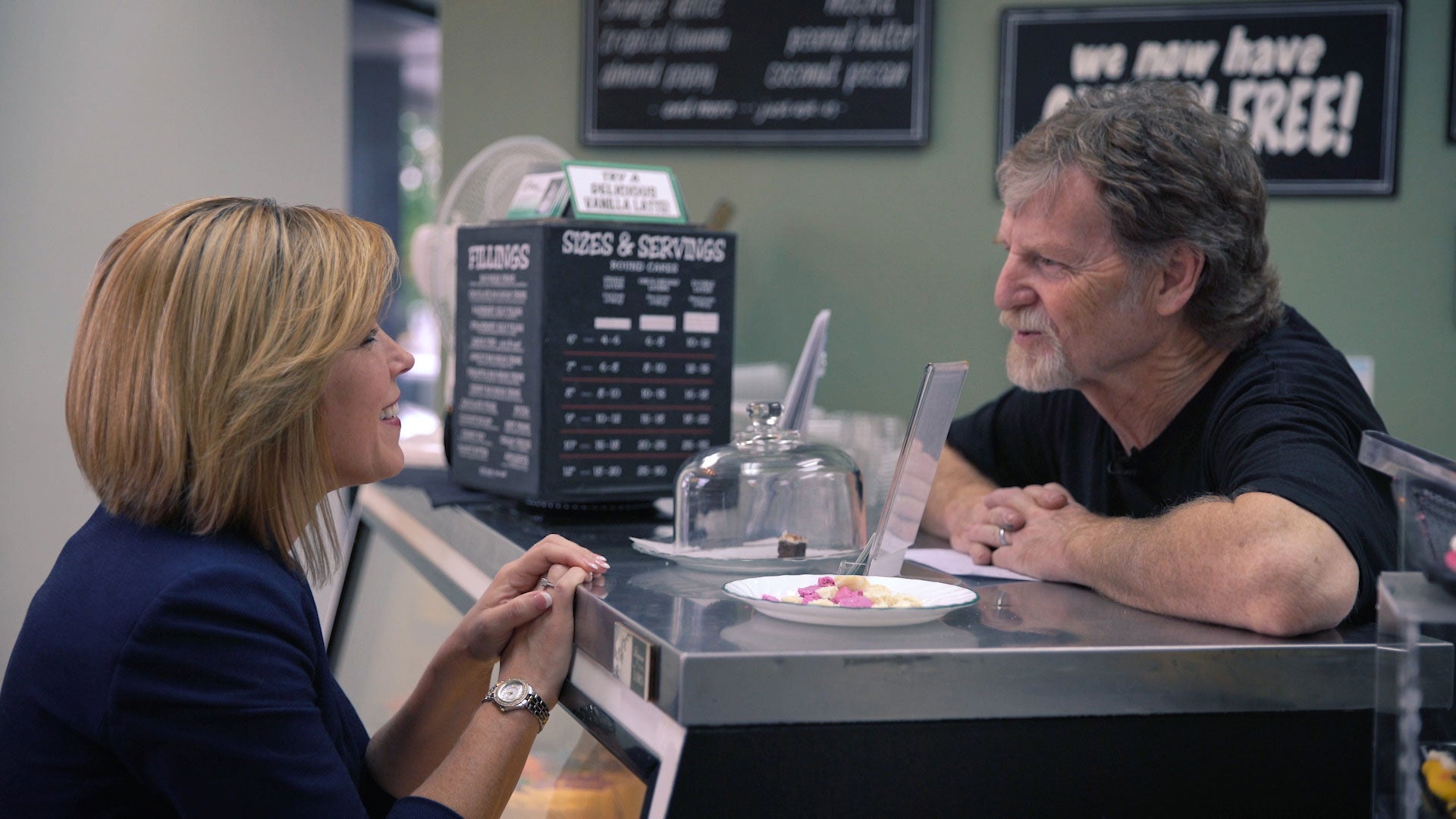
“I think he could have a conversation with anyone and make them feel appreciated and cared for,” Kristen Waggoner says of “cake artist” Jack Phillips. (Photo: The Daily Signal)
Waggoner’s father was the first college graduate in the family, and she became the second.
By choice, her entire education was in Christian schools. She ran cross country and played volleyball and basketball in high school, where she continued to be a good student and graduated as valedictorian in a class of 21.
She won a drama scholarship to go to Northwest University, a school outside Seattle affiliated with the Assemblies of God. She ended up doing debate, winning some tournaments and “best speaker” awards. She also played volleyball. (“That and the law are my two loves.”)
Then it was on to law school at Regent University in Virginia Beach, where she won “best oralist” and the Whittier Moot Court Competition.
What grabbed her about law?
“I think that the pursuit of justice is something that really motivated me, and taking stands on principles,” she says, adding: “But once you start working with clients and you experience being able to help individuals, when most of the time they’re at their low point, it’s very fulfilling.”
‘On the Tough End’
Right after law school, she clerked for Richard Sanders, a member of the Washington state Supreme Court. She first sought a summer job with him two years earlier because he practiced constitutional law, not knowing he was running for a seat on the court.
“The day I called him to follow up on the status of my resume was the day he was elected to the [state] Supreme Court,” she recalls. “He picked up the phone and talked to me for about 45 minutes.”
Nearly two years later, a few weeks out from graduation and planning to clerk for a federal judge in Virginia, she got a call from the law school saying a justice on the Washington Supreme Court had been looking for her for weeks. Sanders was hiring; she interviewed and got a clerkship there.
The law school graduate proved to be “up for the challenge,” Sanders, now back in private practice, recalls, and she worked hard to “get better and better.”
“This is exactly where she should be, and this is what she does best,” the former judge says of Waggoner’s current role. “I think she realizes that she’s on the tough end of those arguments.”
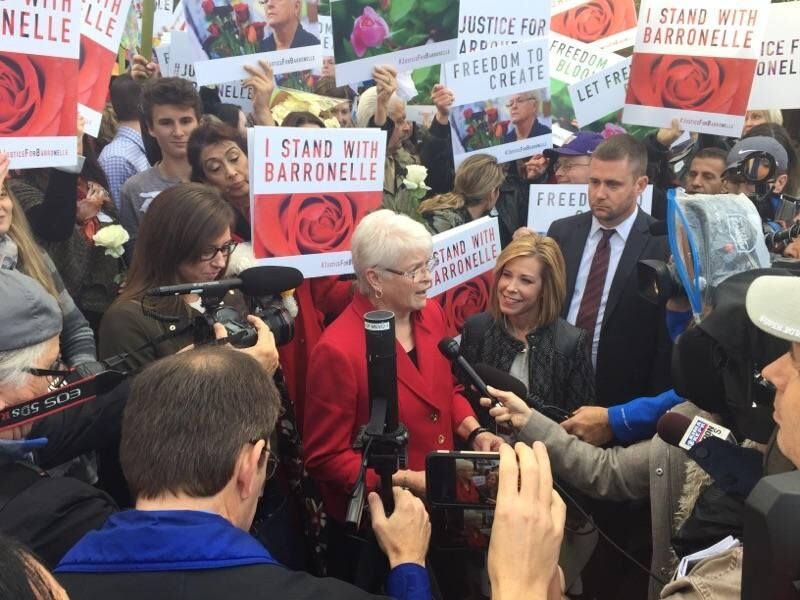
Barronelle Stutzman, flanked by Kristen Waggoner, at a rally outside the Washington Supreme Court hearing of the florist’s case in 2016. (Photo: Alliance Defending Freedom)
Sanders, knowing his law clerk’s interests, proved instrumental in urging her to look into the law firm where she would stay for 17 years.
Ellis, Li & McKinstry had a good reputation for its work in constitutional law in Seattle, not exactly a conservative bastion. It represented many large churches and religious organizations.
Sanders “consistently encouraged” her to go to work there, Waggoner recalls, rather than at a public interest law firm, to gain broader and deeper experience.
“My very first case was a religious liberty case,” Waggoner recalls, “which I don’t think is coincidental.”
‘A Lot Has Changed’
Ellis, Li & McKinstry also happens to be perhaps the nation’s largest private law firm made up of Christian attorneys, partner Keith Kemper tells The Daily Signal.
Kemper describes Waggoner as a tenacious but gracious advocate whose “incredibly strong work ethic” drives her to study up on the case at hand to learn more than her colleagues or opponents.
“She will be better prepared,” says Kemper, who supervised Waggoner in her early years with the firm. “She will know the material backward and forward.”
Waggoner took on a variety of cases as she worked her way to partner, but relished the ones with a religious freedom angle, including some on which she collaborated not only with ADF but the American Center for Law and Justice and the Becket Fund for Religious Liberty.
Her first significant interaction with Alliance Defending Freedom, at the time called the Alliance Defense Fund, came in 2004 when advocates of same-sex marriage sued Washington state in one of the first tests of marriage as the union of one man and one woman.
ADF helped her firm prepare arguments in defense of state law. In 2006, the state Supreme Court agreed with the main argument, ruling that changing public policy is the role of legislators, not the courts.
Waggoner notes that the court also found a rational basis for the Legislature to believe that children need both a mother and a father, and that in legislating the state has an interest in recognizing marriage as the union of a man and a woman.
“That was 2006,” she says. “Eleven years, and a lot has changed.”
‘A Difficult but Important Mission’
Her most prominent cases include one in which Barronelle Stutzman, a florist in Richland, Washington, was taken to court after declining to provide floral services for a longtime customer’s same-sex wedding.
In February, the Washington Supreme Court unanimously ruled that Stutzman violated the state’s anti-discrimination law. That case, known as Arlene’s Flowers, may be affected by the U.S. Supreme Court’s ruling in the Masterpiece Cakeshop case, and Stutzman, 72, plans to be there Tuesday with Phillips and his family for the oral arguments at the Supreme Court.
Another long-running case of Waggoner’s is that of a family pharmacy in Washington that challenged the state’s order to carry “morning after” drugs because the Christian owners, the Stormans family, considered them to be abortion pills. The pharmacy, however, willingly referred customers elsewhere.
In 2015, the U.S. Court of Appeals for the 9th Circuit upheld the state’s position and ordered the Stormans to carry the drugs. Last year, the U.S. Supreme Court declined to review the 7-year-old case.
“Kristen has been our rock since this lawsuit started,” Greg Stormans, vice president of Stormans Inc., says in an email to The Daily Signal, adding:
I think the Lord has gifted Kristen with a very difficult but important mission of defending the constitutional and religious beliefs of all Americans. I have worked with so many attorneys in my life. Kristen stands out to me as someone with a special talent and unique spiritual purpose in life. Our family could not be more grateful for the care and support she has given us over the years.
Making a Change
Waggoner “felt settled” at her law firm, but by 2013 two cases—Arlene’s Flowers and the U.S. Supreme Court’s ruling in U.S. v. Windsor that the federal definition of marriage was unconstitutional—spurred her to explore joining Alliance Defending Freedom full time.
“The right of conscience is critical to the existence of the country and is the first freedom that our other civil liberties are directly connected with,” Waggoner says. “I wanted to be a part of that—that fight to preserve it for my children and my grandchildren.”
She adds: “I just started to have a peace that this is what I should do.”
At first she continued to work from Seattle even after joining Scottsdale, Arizona-based ADF in August 2013. But the opportunity arose the next year to run the organization’s entire U.S. legal division, and she successfully went after it.
Now she oversees 62 staff attorneys and a network of 3,214 “allied” lawyers spread across the nation.
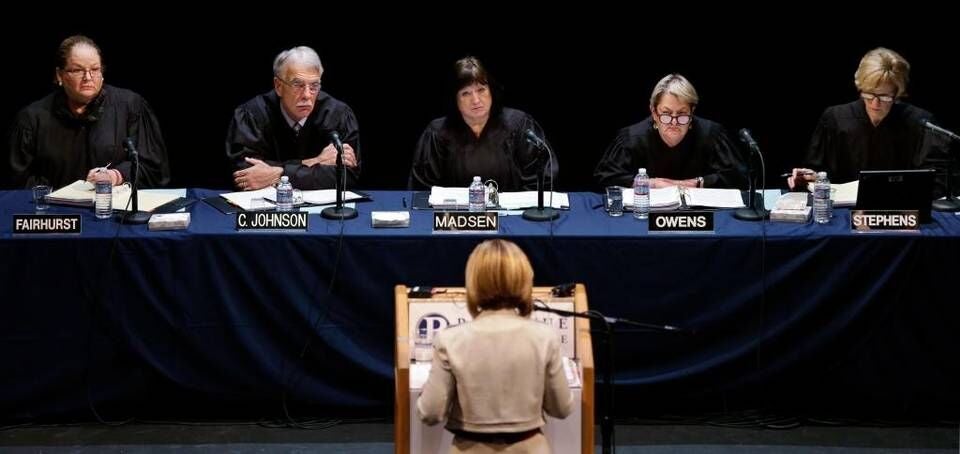
Kristen Waggoner represents Barronelle Stutzman in the Arlene’s Flowers case before the Washington Supreme Court on Nov. 15, 2016. (Photo: Alliance Defending Freedom)
Colleagues credit Waggoner with refining an emphasis on telling the stories of clients in the media as well as the courtroom, and in particular helping clients become more comfortable and effective in recounting their experiences.
“Our clients have, unfortunately, very sad but also very compelling stories to tell,” she says. “We need to let ’em share. And that’s something that is a bit different for ADF.”
‘Best Communicator’
In December 2016, the 23-year-old organization brought on homeschooling pioneer Michael Farris as president and CEO as its longtime executive, Alan Sears, took on the less public role of founder.
Farris, who decided Waggoner would argue the Masterpiece Cakeshop case at the Supreme Court, says he finds her “more indispensable by the day.”
“I think she’s fantastic,” Farris tells The Daily Signal in a phone interview. “She is exceedingly bright, winsome, the best communicator I’ve ever met in my life.”
“It’s a disarming combination of a powerful persona in a petite, smiling person.”
Ryan Anderson, a Heritage Foundation scholar who focuses on religious freedom and has worked closely with Waggoner, describes her as “a sharp legal thinker, persuasive advocate, and strategic leader.”
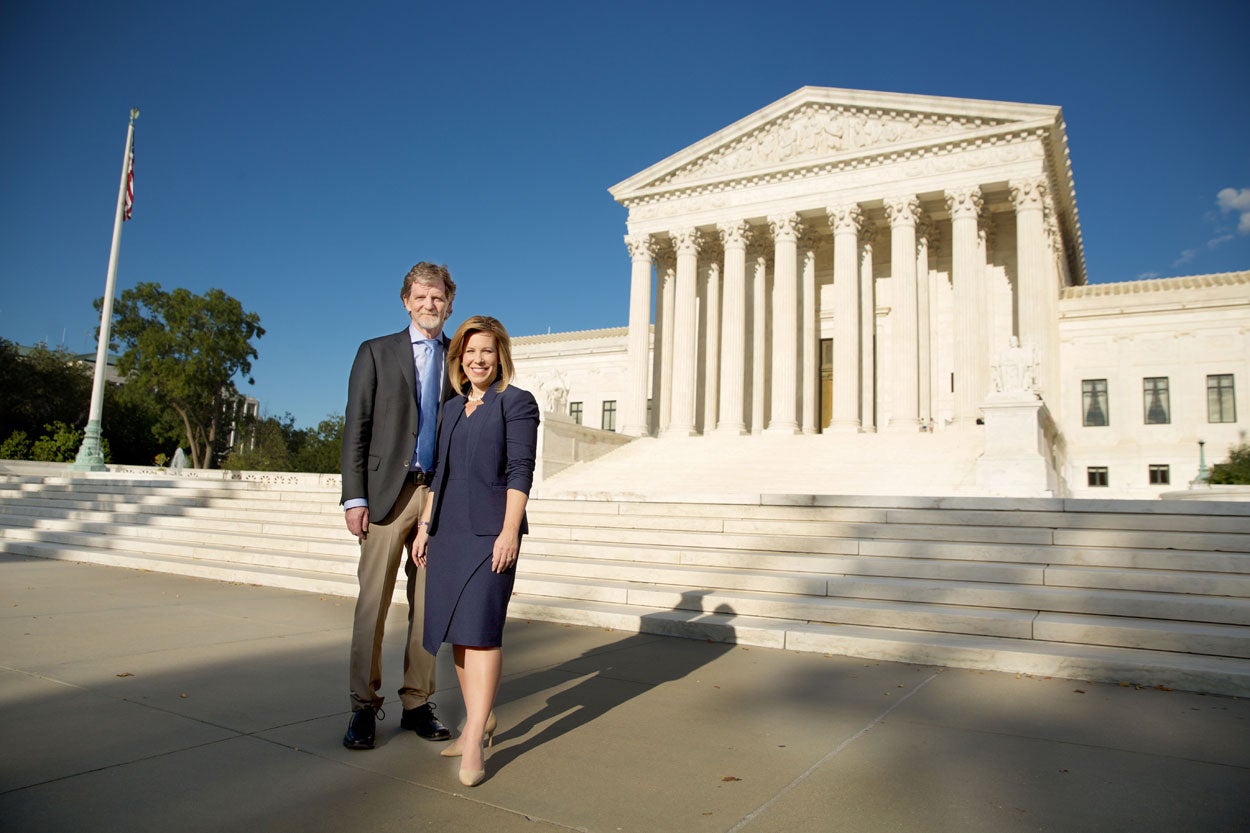
“You just think, ‘Thank God for this opportunity,'” says Kristen Waggoner, here with Jack Phillips, who she represents in a much-watched Supreme Court case. (Photo: Alliance Defending Freedom)
Phillips, who opened his shop in 1993, considers himself a cake artist. Waggoner recalls spending time in Masterpiece Cakeshop on several occasions and being struck by his “tender heart” and close attention to a varied clientele.
“He just loves on every one of them,” she says. “I think he could have a conversation with anyone and make them feel appreciated and cared for.”
Since he stopped making all wedding cakes rather than be forced by previous rulings to fill orders for same-sex marriages, Phillips has lost about 40 percent of the proceeds from sales in the shop he opened in 1993, and cut employees from 10 to four.
“He’s had to bear up under such stress,” Waggoner says. “And I have never heard him complain, not once, about the toll that it’s taken. Nor have I ever heard him speak in any way disparagingly about the couple [who lodged the initial complaint]. In fact, he calls them Charlie and David.”
Words and Music
Much of the media coverage about this and similar cases makes it appear that Phillips and other business owners outright denied any sort of service to gays or lesbians.
In the view of their faith, though, they are declining to dishonor God by using their creativity to celebrate a specific event—in the case at hand, a same-sex marriage. Making them do so would be “coerced speech,” Waggoner says:
I think the biggest misunderstanding is that those like Jack, who can’t express messages that violate their convictions, [aren’t] perhaps loving or compassionate people and they don’t serve everyone—when in fact they do.
Waggoner mentions a quote from author Gretchen Rubin that she posted in her office: “The days are long, but the years are short.”
She runs to relax, but sounds a little guilty about working hours that prevent her from doing more than 5 miles—four or five times a week. And she longs to spend more time with her children.
“I’m trying to be more conscious about a work-life balance, and what de-stresses me is running,” she says. “And then I’m just with my kids. Soccer games, whatever. Time to just fulfill the responsibilities God has given me outside of this professional life.”
Waggoner’s disarming characteristics, on display in her TV appearances, include a beaming smile and friendly, open manner for her audience—including opponents.
“Kristen is engaging, witty, and extremely driven to protect the constitutional rights of God-fearing Americans who are under attack for their religious beliefs,” Stormans says.
“The analogy I like to use is music,” says Farris, her boss. “You’ve got to have good lyrics and you’ve got to have a great melody. Lots of people can get the words right … but to be able to speak the truth with a pleasing melody is a rare and wonderful combination.”
Her appearance on “The View” with Phillips in June, after the high court agreed to hear the case, put that combination on view across the nation.
“The smile is just natural,” Waggoner replies, when asked about her game face. “If anything, that’s a critique I sometimes get: Stop smiling!”
She adds, echoing President Barack Obama’s words from 2012:
I believe there are people of goodwill on both sides, and there should be room for public discourse on issues that matter. In order to have that discourse, we have to be willing to show up and engage in a reasonable, good faith effort.
I do think that some of that involves being vulnerable and authentic, and recognizing there are difficult issues and people have different views on things. I want to be the person in the room who extends a presumption of good faith, even if it might not be merited.
Wild Rides
Waggoner is a self-confessed Mickey Mouse collector.
Colleagues are used to the fact that her office décor reflects a loyalty to Disneyland dating to cherished childhood trips there. The ring tone on her phone is the Disney song “Zip-a-Dee-Doo-Dah.”
“I love Disneyland,” she sighs over the phone. “It’s the happiest place on earth. When I go there, I just feel joy.”
She adds: “I love wild rides.”
Good thing, because she’s been on a bit of one lately.
Waggoner acknowledges that, in such a politically charged environment, she has been subject not only to personal attacks on social media but to threats of violence.
“I think there are very few attorneys who are in this work, on our side, who don’t have to deal with those types of things,” she says. “It’s obviously very unfortunate and it can be worrisome.”
“But the upside is, again, that the people we represent, they’re just second to none in terms of being loving, compassionate individuals. You just think, ‘Thank God for this opportunity.’”
It’s no wonder that her father’s encouragement to find her purpose is on Waggoner’s mind as she gets ready to address the Supreme Court on behalf of one man, but also, she insists, millions of other Americans.
What was her father’s reaction when he learned she would argue this case?
“He said this is what I was born to do.”
She has argued major cases before tough appeals judges, although no other legal venue is quite like the nation’s highest court. Any of the nine justices may derail a carefully prepared argument with multiple questions during the allotted 30 minutes for each side.
“I can’t imagine anyone doing any better on this case than her. I have just no doubt she’s going to be spectacular,” Kemper, the partner at Waggoner’s former law firm, says. “From Day One in the door, she knows her stuff better than anyone else.”
Waggoner phrases it a bit differently.
“I think my takeaway at the end of this is, I have a great team,” she says. “They’re committed to the clients and they’re committed to the principles, and I wouldn’t trade the experience of working arm in arm with them for anything.”
“That’s my secret: We’ve got great attorneys that I trust, and they want freedom to flourish. So it’s a pretty good recipe.”

